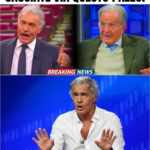General Jack Keane, a four-star general and vice chief of staff of the Army, shared his insights on the current geopolitical situation regarding Ukraine and its relationship with the United States. As chairman of the Institute for the Study of War and a strategic analyst, Keane has closely followed the war’s progression and its implications.

Keane expressed his agreement with Secretary Pompeo’s statements, emphasizing that no modern president has faced the challenges President Zelenskyy has. Over three years of war, Ukraine has endured relentless attacks from a much stronger military force. Despite this, Zelenskyy has remained committed to visiting the front lines to boost the morale of his troops. However, the immense suffering of his people undoubtedly weighs heavily on him. Keane compared Zelenskyy’s experience to that of Abraham Lincoln during the Civil War, highlighting the emotional and strategic burden of leadership in wartime.
Regarding Zelenskyy’s recent meeting in the Oval Office, Keane pointed out that he should have anticipated that reporters would attempt to provoke division, especially those with a known anti-Trump stance. In such situations, Zelenskyy should have remained focused on gratitude and unity, avoiding any controversial statements. Instead, he fell into a political trap, revealing underlying disagreements between himself and the U.S. administration—disputes that should have been addressed privately rather than in a public setting.
A significant aspect of their discussions revolved around a mineral deal between Ukraine and the U.S. While President Trump sees this agreement as a long-term strategic partnership, Zelenskyy appears to perceive it more as a financial arrangement. This misunderstanding could lead to misaligned expectations regarding the economic and security benefits for Ukraine. Trump recognizes that such an agreement would connect the two nations politically and economically for decades, making Ukraine more secure. However, he is cautious about discussing these points before negotiations with President Putin. Keane expressed concern that Zelenskyy might not fully grasp the stakes or has not been adequately briefed on the details.
From Trump’s perspective, he aims to maintain a neutral stance to facilitate peace negotiations. However, he understands the necessity of a stable and secure Ukraine, particularly in preventing further Russian aggression in Eastern Europe. While Zelenskyy desires a direct strategic partnership with the U.S., Trump prioritizes diplomacy with Putin to achieve progress in negotiations.
Keane also analyzed Putin’s reaction to the public discord between Trump and Zelenskyy. The Russian leader likely sees an opportunity to exploit any division. Furthermore, Putin has set firm demands in negotiations, including territorial concessions and military reductions in Ukraine—conditions that suggest he may not be entirely serious about compromise. The U.S. administration, while not explicitly stating it, seeks to push Putin to relinquish occupied territories as part of any agreement.
In conclusion, Keane emphasized that Zelenskyy needs to rectify his missteps by reaffirming his commitment to U.S.-Ukraine cooperation. If he does so, there is a path forward to solidifying a strategic agreement beneficial to both nations. Ultimately, Trump’s priority remains not just the geopolitical and economic implications but also ending the human suffering caused by the war.
News
Nolwenn Leroy : Les Révélations Poignantes de ses 42 ans sur “l’Amour de sa Vie”
Dans l’univers parfois impitoyable du show-business français, rares sont les artistes qui parviennent à maintenir une frontière étanche entre les…
Julio Iglesias à 81 ans : Entre aveux sincères, secrets de famille et vérité sur sa santé, la légende se livre enfin
Julio Iglesias n’est pas seulement une voix ; il est un mythe vivant, une icône de la romance qui a…
Isabelle Nanty : Le combat secret d’une icône entre la vie et la mort après une hospitalisation critique
Le monde du cinéma français a retenu son souffle. Isabelle Nanty, figure emblématique et solaire de nos écrans, a traversé…
CLASH EXPLOSIF : Louis Boyard et Apolline de Malherbe, le duel qui a embrasé le direct !
L’arène médiatique a tremblé ce matin. Ce qui devait être une interview politique classique s’est transformé en un véritable champ…
Jean-Pierre Foucault en deuil : Les adieux déchirants à Marie-José Tramoni, la seule femme qu’il ait jamais épousée
Le paysage médiatique français est en émoi. Derrière l’image de l’animateur infatigable, toujours prêt à distribuer sourires et bonne humeur…
Sarah Knafo “rhabille” la gauche : le choc des vérités sur le Venezuela !
Le séisme politique : Sarah Knafo face à l’aveuglement idéologique Le paysage médiatique français vient d’être le théâtre d’une déflagration…
End of content
No more pages to load












